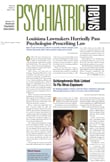Q. I have a colleague who has insurance through the Psychiatrists’ Program, the APA-endorsed Psychiatrists’ Professional Liability Insurance Program. She mentioned that she has access to psychiatric risk management specialists who are available to answer questions specific to her practice. Can you provide more information about this service?
A. Yes. The Risk Management Consultation Service (RMCS) is a value-added service for participants in the Psychiatrists’ Program. The RMCS provides toll-free access to personalized risk management advice and guidance.
Participants can call a toll-free number and speak with a psychiatric risk management specialist Monday through Friday, 8:30 a.m. to 5:30 p.m., Eastern time. Inquiries can also be submitted through the “For Participants Only” section on the Program’s Web site at www.psychprogram.com.
The RMCS staff regularly responds to a broad range of questions, such as these:
• The parents of a young patient are requesting information that I am uncomfortable releasing. What can I do?
• How do I properly document a patient’s informed consent?
• What elements should be included in an information release authorization?
• A patient recently committed suicide, and her distraught family is now calling me. What can I tell them?
• How long do I have to keep my records?
• I have just received a subpoena for patient records in a lawsuit that does not involve me. Do I have to respond? If so, how do I respond without breaching confidentiality?
• How do I end a physician-patient relationship when the patient doesn’t want to end treatment with me?
• How do I respond to a request for information from my licensing board about a patient who filed a complaint?
• I share office space with others. Should I be doing anything to reduce my risk of being sued by my office mate’s patient?
We encourage Program participants to contact us whenever a request or situation is troubling them or raising questions or concerns. No question is insignificant or frivolous, but there are significant questions that are not asked. These unasked questions may increase risk. In fact, the greatest risk may lie in not asking.
Q. I recently received a letter from a patient’s pharmacy benefits manager. The letter listed all prescriptions that the plan has filled for the patient and stated that my prescribing pattern increased the patient’s risk for a medication-related hospitalization. I am concerned that my liability will increase if a risk actually materializes and this letter comes to light. Should I ignore this letter? What steps can I take to minimize my potential liability?
A. You appear to have encountered one of the latest tools in health care benefits cost containment, and you are right to be concerned. In the event of a lawsuit, one can imagine such a letter blown up to poster size and shown to a jury as the plaintiff’s attorney declares indignantly, “See, doctor, even the pharmacy warned you that this could happen.”
But don’t panic. Remember that all psychiatric treatment entails balancing risks and benefits in light of the patient’s individual circumstances, and a poor outcome is not evidence of malpractice. However, like letting the cat out of the bag, once you become aware of the information contained in the letter, your awareness can never be undone, and the information must be dealt with candidly and in a clinically appropriate manner.
The risk management strategies that you can use to reduce your liability risk in this situation are the same strategies that are used anytime treatment decisions are being made—focusing on patient care, obtaining informed consent, and documenting the decision-making process.
These are specific steps you should take in response to this letter:
• Review and research the information: You may wish to take a look at treatment guides from professional organizations as well as any studies or articles cited in the letter. Review the patient’s medication for potential adverse interactions, ask your patients about previously undisclosed medications or treatment modalities, and assess for other potential problems.
• Talk to the patient: Obtain an updated informed consent in light of this new information. Educate the patient about the risks and benefits of the treatment modality in question and your recommendations for treatment. You may decide to leave the treatment plan as is or modify it in a way related or unrelated to the letter.
• Document your decision-making process: Document your reasons for recommending a specific treatment modality in light of its risks. If the chosen treatment deviates from accepted guidelines, document your reasons for the particular choice. Document the updated informed consent discussions.
The bottom line is that information, wherever it may come from, can always be used productively to support patient care.
This column is provided by PRMS, manager of the Psychiatrists’ Program, for the benefit of members. More information about the Program is available by visiting its Web site at www.psychprogram.com; calling (800) 245-3333, ext. 389; or sending an e-mail to [email protected]. ▪
